What Damages Can You Seek In An Instagram Mental Health Lawsuit?
- Last Updated: January 15th, 2026
Key Takeaways
You can claim damages for medical expenses, pain and suffering, lost wages, and possibly punitive damages if Meta is liable for harmful practices on Instagram.
Emotional distress damages are critical in these lawsuits due to the potential negative psychological impact of Instagram, especially on young users' mental health.
Before filing a lawsuit, it's important to document when symptoms began, consult with healthcare professionals, understand legal deadlines, and gather evidence linking Instagram use to mental health issues.
Overview of the Instagram Mental Health Lawsuit
On this page, we’ll provide an overview of the damages you can seek in the Instagram mental health lawsuit, future implications of the Instagram mental health lawsuit, how to initiate a claim for Instagram-related mental health issues, and much more.
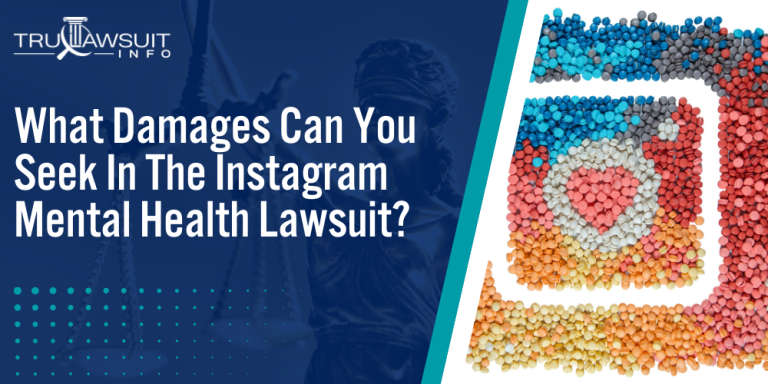
Intro to the Instagram Mental Health Lawsuit
Key aspects to consider in the Instagram mental health lawsuit include:
- Impact on Users: Understanding how Instagram’s algorithms and content can affect mental health and contribute to issues such as anxiety, depression, and body image concerns.
- Legal Grounds: Examining the legal basis for the lawsuit, including allegations of negligence and the duty of care owed by Instagram to its users.
- Evidence and Testimonies: Gathering evidence and personal testimonies that demonstrate the direct impact of Instagram’s platform on users’ mental health.
- Potential Outcomes: Considering the potential outcomes of the lawsuit, including changes in policy, compensation for affected individuals, and increased awareness and support for mental health.
If you believe your mental health has been adversely affected by Instagram, you may qualify to pursue compensation.
Contact TruLawsuit Info using the chat on this page for an instant case evaluation to learn more about filing for the Instagram mental health lawsuit.
Legal Framework Surrounding Social Media and Mental Health
The intersection of social media and mental health is complex and framed by various legal considerations.
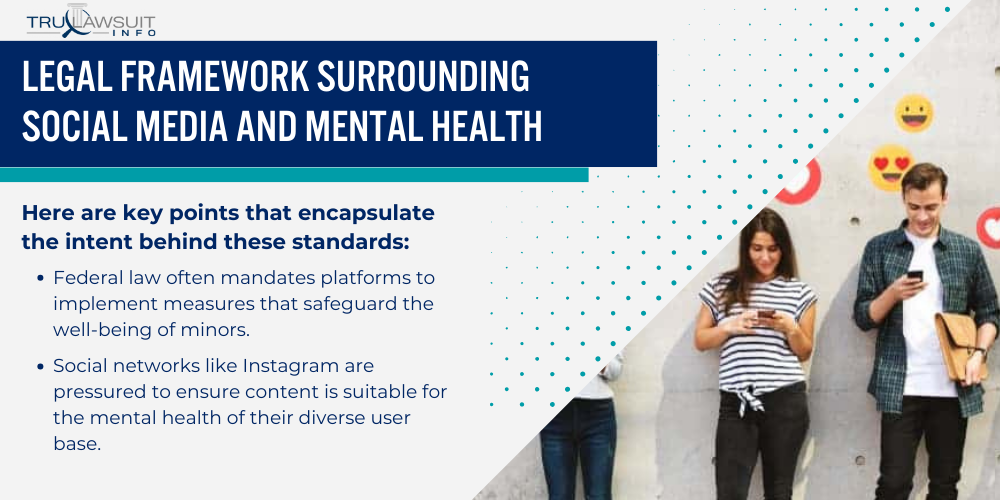
This section focuses on the laws and regulations that outline social media platforms’ responsibilities regarding users’ mental health.
Age-Appropriate Standards in Social Media
When it comes to protecting younger users, age-appropriate standards are pivotal.
Here are key points that encapsulate the intent behind these standards:
- Federal law often mandates platforms to implement measures that safeguard the well-being of minors.
- Social networks like Instagram are pressured to ensure content is suitable for the mental health of their diverse user base.
- Age verification processes are one safety mechanism legislated to prevent minors from viewing harmful content.
- Practices to identify and mitigate age-inappropriate content are crucial in maintaining a safe social media environment.
Personal Injury Lawsuits in the Context of Social Media
Personal injury lawsuits against social media companies are increasingly focusing on the mental health impacts caused by their platforms, charting new territory in legal precedent.
Such cases often involve claims where plaintiffs argue that the platform’s design, algorithms, or content have directly contributed to mental health issues, requiring these companies to be held accountable for their role in these damages.
The domain of personal injury lawsuits pertains directly to claims concerning mental health damages caused by social media:
- Plaintiffs can seek compensatory damages for mental health issues exacerbated or caused by social media.
- Federal courts may hear cases where platforms’ algorithms amplify harmful content, affecting mental health.
- Documented evidence of sustained mental harm can reinforce a plaintiff’s claim against a social media company.
- The success of such lawsuits may hinge on proving the platform’s knowledge of the harm caused and its failure to act.
Key Legislations Affecting Social Media Platform Responsibility
Various key legislations play a role in allocating responsibility to social media platforms for users’ mental health.
Here’s how they are shaping the landscape:
- They establish a baseline for the type of content that may lead to mental health issues.
- Federal law provides a framework for when a platform might be held liable for such damage.
- Legislative reforms may aim to strip certain immunities, like those provided under Section 230, if platforms are negligent.
- Enforcement of these laws ensures that platforms adhere to legal standards, providing a safer environment that considers mental health.
Damages and Liability in Instagram Mental Health Lawsuits
In recent years, Instagram’s mental health lawsuits have centered on the platform’s potential negative impact on users’ well-being, citing various types of damages and questioning Instagram’s liability.
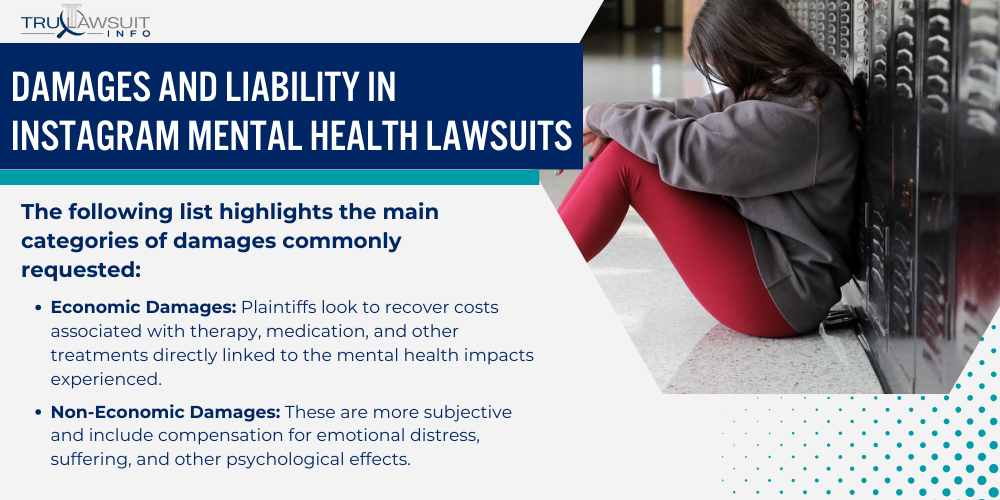
Instagram has been proven to negatively impact adolescent health, contributing to low self-esteem issues, social anxiety, mood disorders, eating disorders, sleep problems, and other lasting emotional scars.
Types of Damages Sought by Plaintiffs
Plaintiffs in Instagram mental health lawsuits typically seek compensation for a range of identified harms.
The following list highlights the main categories of damages commonly requested:
- Economic Damages: Plaintiffs look to recover costs associated with therapy, medication, and other treatments directly linked to the mental health impacts experienced.
- Non-Economic Damages: These are more subjective and include compensation for emotional distress, suffering, and other psychological effects.
- Punitive Damages: In certain cases, if it can be proved that Instagram acted with gross negligence or malice, punitive damages may be sought to punish and deter such behavior in the future.
- Restitution: The goal here is to restore the plaintiff to the position they were in before the onset of the negative impact on their mental health.
Evaluating Instagram’s Liability
Determining Instagram’s liability within these mental health cases requires analysis of multiple legal factors.
Courts will consider the following aspects:
- Duty of Care: Whether Instagram owed a legal responsibility to its users to protect them from foreseeable harm.
- Breach of Duty: Establishing whether Instagram failed to uphold its duty of care.
- Causation: Linking the platform’s specific features or algorithmic choices to the mental health impacts claimed by the plaintiffs.
- Damages: Identifying the actual harm suffered by the plaintiffs as a direct result of Instagram’s alleged negligence.
Case Studies: Instagram Mental Health Lawsuit Outcomes
Several landmark Instagram mental health cases demonstrate the complexities of litigating in this evolving area of law.
A review of these cases reveals diverse outcomes:
- Settlements: Some plaintiffs have reached settlements with Instagram, often including confidentiality clauses preventing the details of the case from becoming public.
- Court Decisions: There have been instances where courts have ruled on the merit of personal injury lawsuits based on mental health claims against an Instagram mental health case.
- Dismissals: There are cases where Instagram mental health lawsuits have been dismissed, with courts finding insufficient evidence to prove Instagram’s liability.
- Ongoing Litigation: Many cases are still in progress, with outcomes pending as courts continue to grapple with the interplay of technology and mental health.
Strategies for Supporting Mental Health Among Social Media Users
In response to the rising concern over the impact of social media on mental health, especially among teens, there is a growing body of strategies aimed at fostering a supportive and positive online environment.
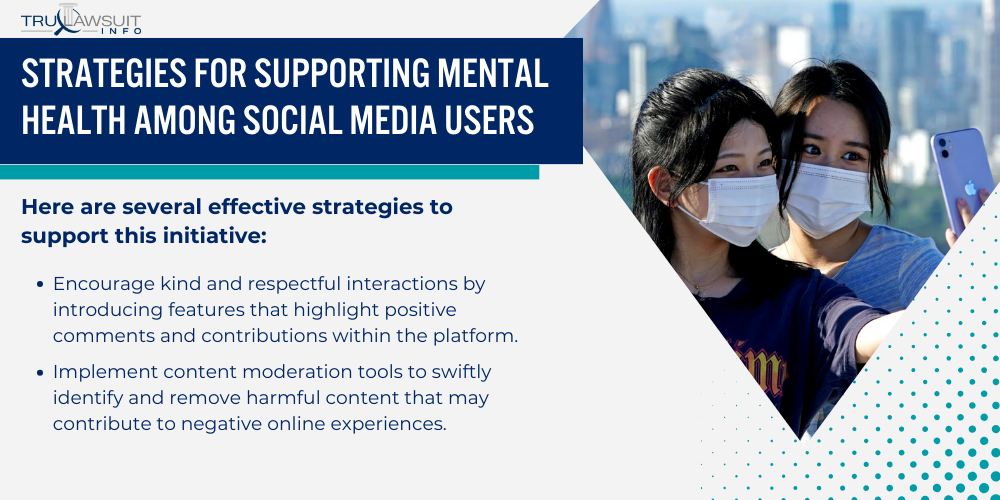
These approaches are designed to counteract potential harms, such as social media addiction and associated mental health problems.
Promoting Positive Experiences Online
Creating positive experiences online is crucial in fostering a healthy digital environment.
Here are several effective strategies to support this initiative:
- Encourage kind and respectful interactions by introducing features that highlight positive comments and contributions within the platform.
- Implement content moderation tools to swiftly identify and remove harmful content that may contribute to negative online experiences.
- Promote content that fosters a positive community, such as success stories of individuals overcoming adversity, which young users can find inspiring and supportive.
- Reward positive behavior on platforms with recognition systems, encouraging users to engage in uplifting interactions.
Tools and Initiatives to Support Teens’ Mental Health
To better support the mental health of teenagers in the digital era, a multifaceted approach involving integrating mental health resources into social media platforms is essential.
This strategy includes providing accessible in-app support services and educational content and partnering with mental health organizations to develop comprehensive awareness campaigns and programs.
Several tools and initiatives can play a pivotal role in supporting teens’ mental health:
- Develop and incorporate mental health resources directly into social media platforms to provide support and advice on managing online experiences.
- Provide access to in-app counseling services or helplines that teens can reach out to when feeling overwhelmed or distressed.
- Feature educational content about the signs of social media addiction and strategies to engage in healthy usage.
- Collaborate with mental health organizations to create programs and campaigns that raise awareness about mental health challenges and solutions.
Educating Young People on Social Media Usage
Education plays a crucial role in fostering responsible and healthy social media usage among young people, emphasizing the risks and the positive ways to engage with these platforms.
Schools and communities increasingly recognize the need to include digital literacy in curriculums and host informative sessions for both teens and their parents, addressing the complex dynamics of social media.
Education is a powerful tool in empowering young people to use social media responsibly:
- Integrate digital literacy programs into school curriculums to teach students about the impacts of their online behavior and usage patterns.
- Host workshops and seminars for both teens and parents to discuss the potential mental health risks associated with excessive social media usage.
- Create interactive learning experiences that simulate social media scenarios and teach healthy responses to various online situations.
- Launch awareness campaigns that focus on the importance of periodic digital detoxes and the benefits of engaging in real-world activities.
Research and Evidence in Addressing the Mental Health Crisis
The relationship between social media use and mental health is a critical area of study, where extensive research has underscored the pressing need for better understanding and interventions.
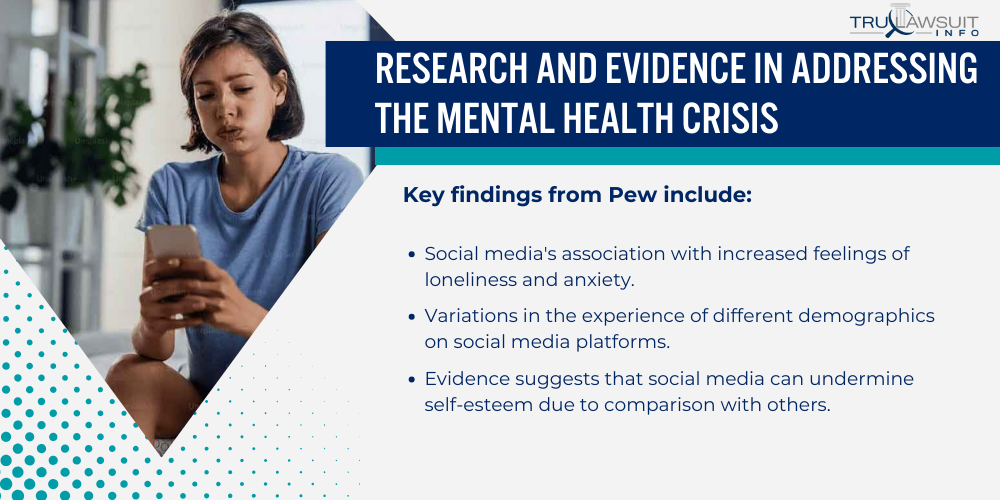
Pew Research Center’s Findings on Social Media’s Effects
Pew Research Center is known for its comprehensive studies on various aspects of social media.
Notably, their work has illuminated concerns about social media’s impact on mental health, especially among the youth.
Key findings from Pew include:
- Social media’s association with increased feelings of loneliness and anxiety.
- Variations in the experience of different demographics on social media platforms.
- Evidence suggests that social media can undermine self-esteem due to comparison with others.
- A correlation between social media use and sleep disruption, which is linked to poor mental health outcomes.
Internal Research from Social Media Companies
Companies like Meta collect and analyze vast amounts of data, sometimes revealing concerning trends about the platforms’ influence on mental health.
Their internal research presentations have shed light on important details such as:
- The specific ways Meta’s platforms, like Instagram, are connected to body image issues among teenagers.
- Internal acknowledgment of the negative impacts of social media on young users.
- Data that suggest social media usage patterns are contributing to a decline in mental well-being.
- Efforts by the company to mitigate harm, though the effectiveness and transparency of these efforts are often questioned.
Assessing the Prevalence of Mental Health Problems Across Platforms
Research into mental health problems related to social media usage is revealing important insights, showing that not all platforms impact users in the same way.
Studies are focusing on how the frequency of use, type of content, and the unique characteristics of each platform correlate with mental health outcomes, providing a more nuanced understanding of the digital landscape’s effect on well-being.
When considering mental health problems across different social media platforms, research has looked into various aspects:
- Frequency of use and its relationship to mental health.
- Different platforms affect mental health in unique ways
- The kinds of content that are most likely to be associated with negative mental health effects.
- Comparing self-reported mental health concerns with usage data to identify patterns.
Implications of Instagram Lawsuits for the Future of Social Media
The legal challenges faced by Instagram have the potential to reshape the landscape of social media, particularly in how platforms engage with and protect their users.
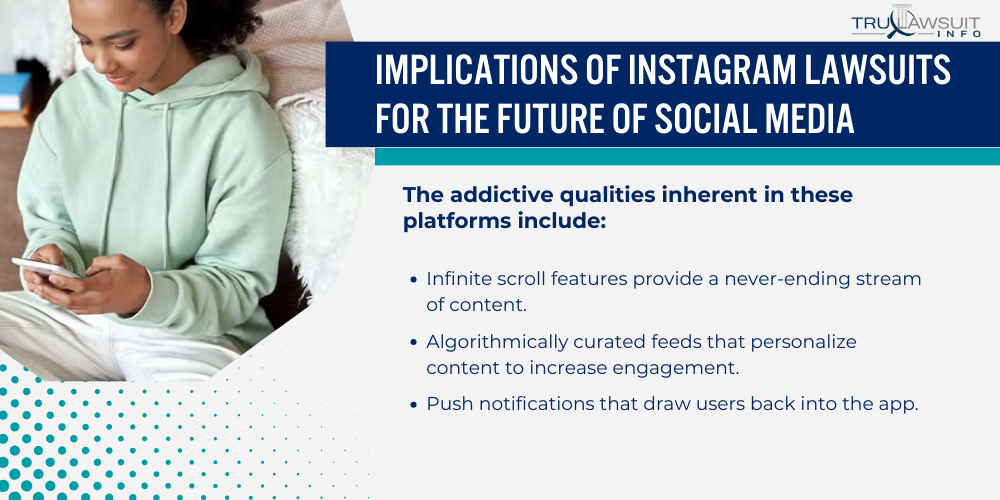
Challenging the Addictive Nature of Social Media Platforms
Litigation against Instagram highlights the addictive nature of social media and its effects on users.
Recent lawsuits foreground the argument that platforms like Instagram are engineered to captivate users’ attention in ways that can be detrimental to their mental health.
The addictive qualities inherent in these platforms include:
- Infinite scroll features provide a never-ending stream of content.
- Algorithmically curated feeds that personalize content to increase engagement.
- Push notifications that draw users back into the app.
- The Like system provides instant gratification and social validation.
The Commitment of Social Media Companies to Protect Young Users
Attorneys general and other legal entities are scrutinizing the commitment of social media companies to protect their most vulnerable consumers, especially young users.
The outcomes of these lawsuits might compel platforms to enact more stringent measures to ensure the welfare of underage users.
Key protective measures could include:
- Implementing usage time limits for younger users to discourage prolonged exposure.
- Providing content filters to shield young users from harmful material.
- Creating age-appropriate standards for the many apps teens use
- Transparency in content moderation to exhibit the platform’s protective steps.
Long-Term Effects of Lawsuits on Industry Practices
The ongoing lawsuits against Instagram could have long-lasting implications on industry practices.
These cases may set precedents that shape future regulations and determine how companies design powerful and unprecedented technologies.
These long-term effects may manifest in various ways:
- Policies reflecting increased corporate responsibility for user wellbeing.
- Innovations designed with children’s mental health in mind, reducing the risk of addiction.
- Greater legal accountability for protecting users from potential harm.
- Enhanced ethical considerations in the development of new social media features.
Frequently Asked Questions
-
Claims of emotional distress in social media lawsuits typically fall under two categories: intentional infliction of emotional distress and negligent infliction of emotional distress.
Intentional infliction requires proof that the defendant’s conduct was extreme and outrageous, causing severe emotional distress.
Conversely, negligent infliction pertains to cases where the defendant’s failure to act with reasonable care resulted in emotional harm to the plaintiff.
-
Studies have shown a correlation between the use of Instagram and an increase in rates of anxiety and depressive symptoms among teenagers who are struggling with mental health issues.
Establishing proof of harm in an Instagram-related mental health legal case hinges on a combination of documentation and expert testimony.
Medical records, mental health evaluations, and expert analysis are crucial for substantiating claims.
Additionally, correlation between Instagram usage and the onset or exacerbation of mental health issues is necessary to establish causation.
-
Legal precedents in this area are evolving as courts are still examining the extent of social media platform liability in mental health cases.
Key cases may address issues such as the responsibility of platforms in moderating harmful content or the role their algorithms play in exacerbating users’ mental health conditions.
These decisions can influence future litigation and platform policies.
-
A user can claim damages for mental health issues they attribute to Instagram algorithms if they can demonstrate that these algorithms played a significant role in causing harm.
This would involve showing that the specific features of the platform contributed to the deterioration of the user’s mental health and quantifying the damages endured as a result.

Attorney Jessie Paluch, founder of TruLawsuit Info, has over 25 years of experience as a personal injury and mass tort attorney, and previously worked as an international tax attorney at Deloitte. Jessie collaborates with attorneys nationwide — enabling her to share reliable, up-to-date legal information with our readers.
Legally Reviewed
This article has been written and reviewed for legal accuracy and clarity by the team of writers and legal experts at TruLawsuit Info and is as accurate as possible. This content should not be taken as legal advice from an attorney. If you would like to learn more about our owner and experienced injury lawyer, Jessie Paluch, you can do so here.
Fact-Checked
TruLawsuit Info does everything possible to make sure the information in this article is up to date and accurate. If you need specific legal advice about your case, contact our team by using the chat on the bottom of this page. This article should not be taken as advice from an attorney.
You can learn more about the Social Media Harm Lawsuit by visiting any of our pages listed below:
Here, at Tru Lawsuit Info, we’re committed to helping victims get the justice they deserve.
To do this, we actively work to connect them with attorneys who are experts in litigating cases similar to theirs.
Table of Contents
Tru Lawsuit Info is a reliable source of information about issues that may affect your health and safety, such as faulty products, data breaches, and environmental hazards.
Our team of experienced writers collaborates with medical professionals, lawyers, and advocates to produce informative articles, guides, and other resources that raise awareness of these topics.
Our thorough research provides consumers with access to reliable information and updates on lawsuits happening around the country. We also can connect consumers with attorneys if they need assistance.
Here, at Tru Lawsuit Info, we’re committed to helping victims get the justice they deserve.
To do this, we actively work to connect them with attorneys who are experts in litigating cases similar to theirs.
